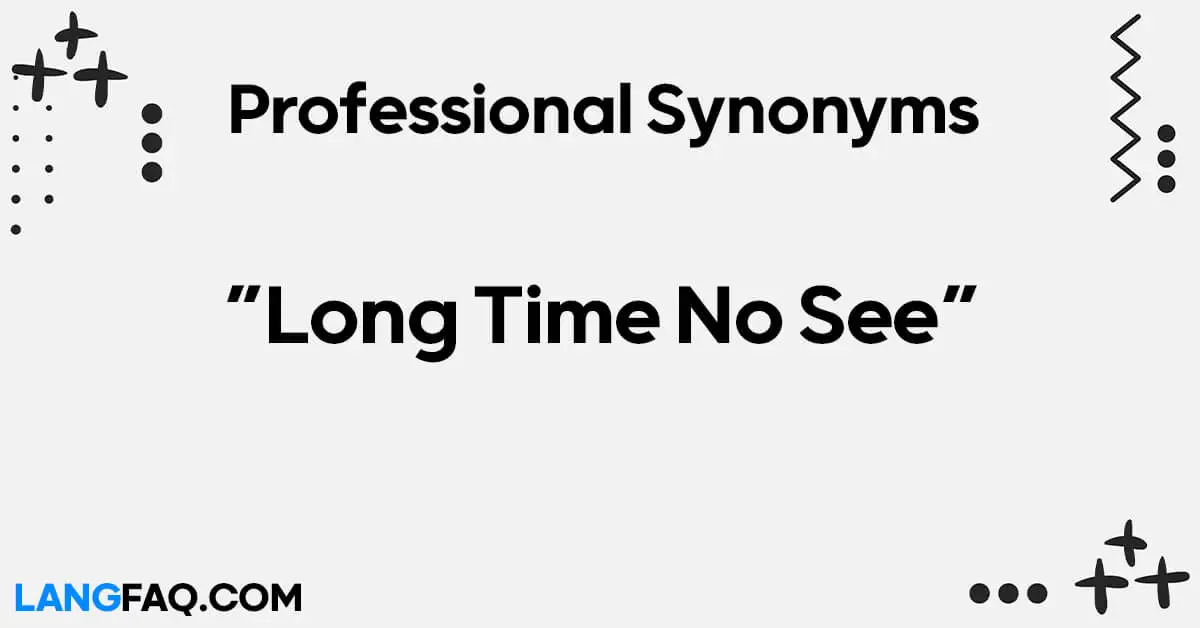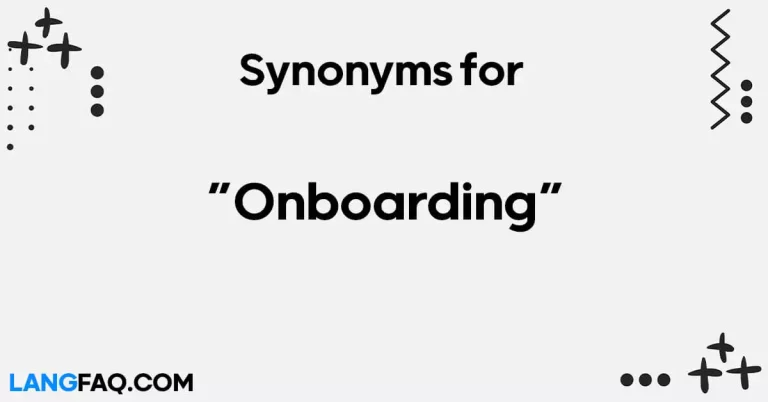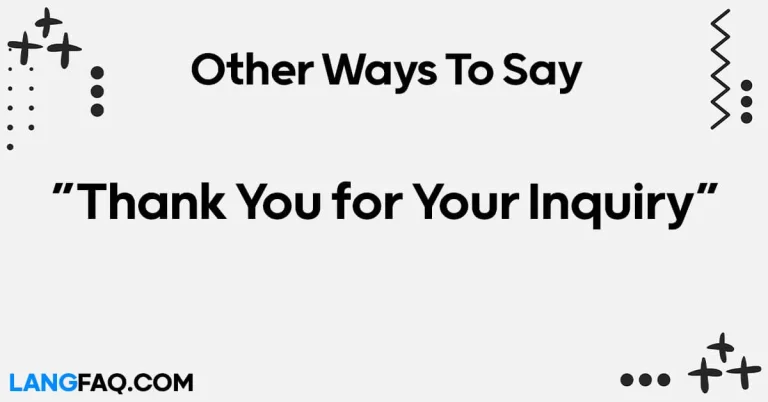When it comes to communication, using diverse and professional vocabulary can make a significant difference in how your message is perceived. In this article, we will explore 12 professional synonyms for the commonly used phrase “Long Time No See.”
By incorporating these alternatives into your conversations, you can enhance your language skills and make a lasting impression. Let’s dive into these expressions that can add a touch of sophistication to your communication.
What to Say Instead of “Long Time No See”
- Extended Absence
- Prolonged Hiatus
- Lengthy Interlude
- Sustained Separation
- Protracted Disconnection
- Continual Non-Interaction
- Extended Non-Appearance
- Long-Term Non-Presence
- Sustained Non-Engagement
- Protracted Non-Meeting
- Lengthy Non-Encounter
- Prolonged Non-Attendance
These alternatives can be used to convey the idea of a significant period of time without seeing or meeting someone in a more formal or professional manner.
Here’s a table with the meanings and examples of the 12 professional synonyms for “Long Time No See”:
| Synonym | Meaning | Example Sentence |
|---|---|---|
| Extended Absence | A lengthy period without contact | “I apologize for my extended absence from the team.” |
| Prolonged Hiatus | An extended break or interruption | “Her prolonged hiatus from work surprised everyone.” |
| Lengthy Interlude | A long and intervening period | “The lengthy interlude between their meetings made it challenging to reconnect.” |
| Sustained Separation | Continuous and extended distance | “The sustained separation made it difficult to maintain our friendship.” |
| Protracted Disconnection | An extended state of disconnection | “The protracted disconnection between us needs to be addressed.” |
| Continual Non-Interaction | Ongoing lack of interaction | “The continual non-interaction with colleagues affected my work relationships.” |
| Extended Non-Appearance | Prolonged absence from view | “His extended non-appearance at social gatherings raised questions.” |
| Long-Term Non-Presence | Prolonged absence over time | “Her long-term non-presence in the industry was quite surprising.” |
| Sustained Non-Engagement | Continuous lack of involvement | “The sustained non-engagement of the team led to project delays.” |
| Protracted Non-Meeting | An extended period without meeting | “The protracted non-meeting of the committee postponed decisions.” |
| Lengthy Non-Encounter | A prolonged period without encountering | “Their lengthy non-encounter made the reunion emotional.” |
| Prolonged Non-Attendance | An extended absence from an event | “His prolonged non-attendance at the conference was noted by many.” |
These synonyms offer various ways to express the concept of a long time without seeing or meeting someone, allowing for more precise and professional communication.
Extended Absence
Meaning: Extended absence refers to a prolonged period without contact or presence, often indicating a substantial gap in communication or interaction.
When and Where to Use:
- Formal Context: You can use “extended absence” in professional settings, such as business emails or formal reports, to describe a significant period without someone’s presence or involvement.
- Informal Context: In casual conversations with friends or acquaintances, “extended absence” can be employed to explain why you haven’t been in touch for a while.
Example Sentences:
- Formal: “I regret to inform you that due to my extended absence from the office, some projects may have been delayed.”
- Informal: “I apologize for my extended absence from our group chats; I’ve been caught up with work lately.”
Variations:
- Colleague Scenario: “My prolonged absence from team meetings has affected our project progress.”
- Friend Scenario: “I’m sorry for the lengthy absence from our get-togethers; let’s plan something soon.”
Dictionary Insight: According to Cambridge Dictionary, “extended absence” means a long period of time when someone is not present or available.
Usage Tip: Use “extended absence” when you want to emphasize the duration of the absence in a formal or informal context.
Prolonged Hiatus
Meaning: A prolonged hiatus signifies an extended break or interruption, indicating that someone has been away for a considerable period.
When and Where to Use:
- Formal Context: In business communication or official reports, you can use “prolonged hiatus” to describe a situation where a project or activity has been on hold for an extended time.
- Informal Context: Among friends or in casual conversations, this phrase can be used humorously to explain a long absence.
Example Sentences:
- Formal: “Due to a prolonged hiatus in production, we need to assess the impact on our supply chain.”
- Informal: “I’m back from my prolonged hiatus; it feels great to catch up with everyone!”
Variations:
- Work Scenario: “The project experienced a lengthy hiatus due to budget constraints.”
- Friend Scenario: “After a prolonged hiatus, our gaming group is reuniting this weekend.”
Dictionary Insight: Cambridge Dictionary defines “hiatus” as a pause or gap where something is missing.
Usage Tip: Employ “prolonged hiatus” when you want to convey the idea of a significant break or interruption formally or playfully.
Lengthy Interlude
Meaning: A lengthy interlude refers to a long and intervening period, often indicating a pause or gap between activities or meetings.
When and Where to Use:
- Formal Context: Use “lengthy interlude” in professional emails or presentations to describe a substantial gap between significant events or tasks.
- Informal Context: Among friends or in casual conversations, this phrase can be used humorously to explain a long gap between meetings.
Example Sentences:
- Formal: “The lengthy interlude between project phases allowed us to reevaluate our strategy.”
- Informal: “Sorry for the lengthy interlude between our movie nights; life got busy!”
Variations:
- Business Scenario: “The lengthy interlude between meetings gave us time to prepare thoroughly.”
- Friend Scenario: “Let’s not have such a lengthy interlude between our hiking trips next time.”
Dictionary Insight: According to Cambridge Dictionary, “interlude” means a period of time between two events or activities.
Usage Tip: Utilize “lengthy interlude” when you want to highlight a substantial gap or break in a formal or lighthearted manner.
Sustained Separation
Meaning: Sustained separation refers to a continuous and extended distance or lack of contact between individuals, indicating a persistent state of disconnect.
When and Where to Use:
- Formal Context: Incorporate “sustained separation” into business correspondence or reports to describe a prolonged period of disconnection or lack of interaction.
- Informal Context: Among friends or in casual conversations, this phrase can be used to explain why you haven’t seen or heard from someone in a while.
Example Sentences:
- Formal: “The sustained separation between the two teams led to miscommunication and delays.”
- Informal: “I apologize for the sustained separation; let’s catch up over coffee soon!”
Variations:
- Work Scenario: “The sustained separation between departments hindered collaborative efforts.”
- Friend Scenario: “Our sustained separation made me realize how much I missed our conversations.”
Dictionary Insight: Cambridge Dictionary defines “sustained” as continuing for an extended period or without interruption.
Usage Tip: Employ “sustained separation” when you want to emphasize the continuous and extended nature of the lack of contact formally or informally.
Protracted Disconnection
Meaning: Protracted disconnection signifies an extended state of disconnection or lack of communication, indicating a persistent and drawn-out disconnect.
When and Where to Use:
- Formal Context: Use “protracted disconnection” in professional contexts like business reports or official emails to describe a prolonged and problematic lack of connection.
- Informal Context: Among friends or acquaintances, this phrase can be used to humorously explain a long period without contact.
Example Sentences:
- Formal: “The protracted disconnection between our servers resulted in data loss.”
- Informal: “Apologies for the protracted disconnection; my phone was acting up.”
Variations:
- Tech Scenario: “The protracted disconnection of the internet affected remote work productivity.”
- Friend Scenario: “Our protracted disconnection led to some hilarious misunderstandings.”
Dictionary Insight: According to Cambridge Dictionary, “protracted” means lasting for an extended period, often longer than expected.
Usage Tip: Employ “protracted disconnection” when you want to emphasize a prolonged and problematic lack of connection in a formal or lighthearted manner.
Continual Non-Interaction
Meaning: Continual non-interaction indicates an ongoing lack of interaction or engagement, highlighting a continuous state of not engaging with someone.
When and Where to Use:
- Formal Context: Incorporate “continual non-interaction” into professional reports or discussions to describe a persistent lack of engagement, which may have consequences.
- Informal Context: Among friends or in casual conversations, this phrase can be used to express a continuous state of not interacting.
Example Sentences:
- Formal: “The project’s success was hindered by the continual non-interaction of team members.”
- Informal: “I noticed a pattern of continual non-interaction in our group chat lately.”
Variations:
- Work Scenario: “The continual non-interaction with clients affected our business relationships.”
- Friend Scenario: “Our continual non-interaction made me realize how much I miss our outings.”
Dictionary Insight: Cambridge Dictionary defines “continual” as happening repeatedly over a period of time.
Usage Tip: Use “continual non-interaction” when you want to emphasize the ongoing and persistent nature of the lack of engagement, whether formally or informally.
Extended Non-Appearance
Meaning: Extended non-appearance refers to a prolonged absence from view or public presence, indicating that someone has been noticeably absent for an extended period.
When and Where to Use:
- Formal Context: Use “extended non-appearance” in professional settings, such as business reports or formal communication, to describe a prolonged absence that has been noticeable.
- Informal Context: Among friends or acquaintances, this phrase can be employed humorously to explain a prolonged absence from social gatherings.
Example Sentences:
- Formal: “The CEO’s extended non-appearance at company events raised concerns among the employees.”
- Informal: “I apologize for my extended non-appearance at our weekly game nights; work has been hectic.”
Variations:
- Corporate Scenario: “The extended non-appearance of the manager during crucial meetings was a cause for concern.”
- Friend Scenario: “After my extended non-appearance from our gatherings, I’m excited to catch up.”
Dictionary Insight: Cambridge Dictionary defines “appearance” as the act of being seen or coming into view.
Usage Tip: Utilize “extended non-appearance” when you want to emphasize a prolonged absence that has been noticeable, whether formally or informally.
Long-Term Non-Presence
Meaning: Long-term non-presence indicates an extended period without someone’s presence or involvement, emphasizing the duration of their absence.
When and Where to Use:
- Formal Context: Incorporate “long-term non-presence” into professional reports or discussions to describe a prolonged absence that has persisted over time.
- Informal Context: Among friends or in casual conversations, this phrase can be used to express the extended duration without someone’s presence.
Example Sentences:
- Formal: “The project faced challenges due to the long-term non-presence of key team members.”
- Informal: “I appreciate your understanding during my long-term non-presence; I’m back now.”
Variations:
- Business Scenario: “The long-term non-presence of the project lead required delegation of responsibilities.”
- Friend Scenario: “During my long-term non-presence, I realized how important our friendship is.”
Dictionary Insight: According to Cambridge Dictionary, “presence” refers to the state of being in a particular place or involved in a particular activity.
Usage Tip: Employ “long-term non-presence” when you want to emphasize the extended duration of someone’s absence, whether in a formal or informal context.
Sustained Non-Engagement
Meaning: Sustained non-engagement signifies continuous and prolonged lack of involvement or interaction, indicating a persistent state of not participating.
When and Where to Use:
- Formal Context: Use “sustained non-engagement” in professional contexts, such as business emails or reports, to describe a persistent lack of involvement that may have consequences.
- Informal Context: Among friends or acquaintances, this phrase can be employed to express a continuous state of not engaging in activities or conversations.
Example Sentences:
- Formal: “The sustained non-engagement of the board members led to delays in decision-making.”
- Informal: “I’ve noticed a pattern of sustained non-engagement in our group’s discussions.”
Variations:
- Work Scenario: “The sustained non-engagement of the employee affected team dynamics.”
- Friend Scenario: “During my sustained non-engagement, I realized how much I value our interactions.”
Dictionary Insight: Cambridge Dictionary defines “engagement” as the act of being involved in an activity or participating in something.
Usage Tip: Utilize “sustained non-engagement” when you want to emphasize the continuous and prolonged nature of the lack of involvement, whether formally or informally.
Protracted Non-Meeting
Meaning: Protracted non-meeting indicates an extended period without a meeting or gathering, emphasizing that no formal or informal meetings have taken place over an extended duration.
When and Where to Use:
- Formal Context: Incorporate “protracted non-meeting” into professional reports or discussions when you want to highlight a prolonged period without formal meetings or gatherings.
- Informal Context: Among friends or acquaintances, this phrase can be used humorously to explain why you haven’t met up for a while.
Example Sentences:
- Formal: “The protracted non-meeting of the project team resulted in a lack of alignment on project goals.”
- Informal: “After our protracted non-meeting, it’s about time we plan a get-together!”
Variations:
- Corporate Scenario: “The protracted non-meeting between departments affected cross-functional collaboration.”
- Friend Scenario: “Our protracted non-meeting made me realize how much I miss our outings.”
Dictionary Insight: According to Cambridge Dictionary, “meeting” refers to an occasion when people come together to discuss something.
Usage Tip: Employ “protracted non-meeting” when you want to emphasize the extended period without formal or informal gatherings, whether in a formal or lighthearted context.
Lengthy Non-Encounter
Meaning: Lengthy non-encounter indicates a prolonged period without encountering someone, emphasizing the duration without chance meetings or interactions.
When and Where to Use:
- Formal Context: Use “lengthy non-encounter” in professional discussions or written communication to describe a prolonged period without accidental or unplanned interactions.
- Informal Context: Among friends or in casual conversations, this phrase can be used humorously to explain why you haven’t bumped into someone for a while.
Example Sentences:
- Formal: “The lengthy non-encounter with key stakeholders delayed project feedback.”
- Informal: “After our lengthy non-encounter, it was great running into you at the coffee shop!”
Variations:
- Business Scenario: “The lengthy non-encounter with clients reduced spontaneous problem-solving.”
- Friend Scenario: “Our lengthy non-encounter made our chance meeting even more enjoyable.”
Dictionary Insight: Cambridge Dictionary defines “encounter” as a meeting, especially one that happens by chance.
Usage Tip: Utilize “lengthy non-encounter” when you want to emphasize the extended duration without unplanned interactions, whether in a formal or informal context.
Prolonged Non-Attendance
Meaning: Prolonged non-attendance refers to an extended absence from an event, meeting, or gathering, highlighting that someone has been consistently absent for an extended period.
When and Where to Use:
- Formal Context: Incorporate “prolonged non-attendance” into professional reports or communication to describe a prolonged absence from important events or meetings.
- Informal Context: Among friends or acquaintances, this phrase can be used humorously to explain a long absence from social gatherings.
Example Sentences:
- Formal: “The prolonged non-attendance of key stakeholders affected the outcome of the conference.”
- Informal: “Apologies for my prolonged non-attendance at recent parties; I’ve been swamped with work.”
Variations:
- Corporate Scenario: “The prolonged non-attendance of team members hindered project progress.”
- Friend Scenario: “After my prolonged non-attendance, I’m eager to join our weekend hangouts again.”
Dictionary Insight: According to Cambridge Dictionary, “attendance” refers to the act of being present at a particular event or place.
Usage Tip: Employ “prolonged non-attendance” when you want to emphasize the extended period without attending events or gatherings formally or informally.
Is It Professional to Say “Long Time No See”?
When it comes to professional communication, the use of certain colloquial phrases, such as “Long Time No See,” can be a subject of debate. While this phrase is widely recognized and understood in informal settings, its appropriateness in professional contexts can be questioned. Let’s delve into whether it is considered professional to use “Long Time No See” in your interactions and explore alternatives that may be better suited for formal communication.
Understanding the Origin
“Long Time No See” is believed to have originated from a direct translation of a Chinese phrase, “hǎo jiǔ bù jiàn” (好久不见). It gained popularity in English during the late 19th century and has since been used informally to express that it’s been a while since seeing someone. However, its informal nature makes it less suitable for professional conversations.
Professional Communication Standards
In professional settings, maintaining a formal and polished tone is crucial. Using informal phrases like “Long Time No See” may come across as unprofessional or even casual, which might not align with the expected standards of communication. Here are a few reasons why:
1. Lack of Precision
“Long Time No See” is vague in terms of time duration. In professional communication, clarity and precision are essential. Instead of leaving room for interpretation, it’s better to specify the duration of the absence if necessary.
2. Casual Tone
The phrase carries a casual and relaxed tone, which may not be suitable for conveying professionalism, respect, or seriousness in business or formal situations.
3. Alternative Options
There are various alternatives that can be used in professional communication to convey the same sentiment of a prolonged absence without resorting to informal phrases. Using these alternatives can help you maintain a more polished image:
- “It has been a considerable amount of time since we last met.”
- “I trust this message finds you well after our extended time without contact.”
- “We haven’t had the opportunity to connect for an extended period.”
- “It’s been a while since our last interaction.”
When to Use “Long Time No See”
While “Long Time No See” may not be the most professional choice for formal communication, it can still be appropriate in certain informal contexts. For instance:
- Casual Conversations with Friends: When catching up with friends or acquaintances, using this phrase is perfectly acceptable and relatable.
- Informal Emails: In some cases, if you have a close and informal relationship with a colleague or client, using it in an email may be acceptable. However, exercise caution and assess the appropriateness of the context.
Conclusion
In professional communication, it’s advisable to err on the side of formality. While “Long Time No See” is a common phrase in informal conversation, it may not be the best choice when you need to maintain a professional image. Instead, opt for more precise and formal alternatives to convey the same message effectively while adhering to professional communication standards. By doing so, you can ensure that your interactions are polished, respectful, and aligned with the expectations of the professional world.
Email samples using the alternatives to “Long Time No See”
Here are email samples using the alternatives to “Long Time No See” in various professional contexts:
“It has been a considerable amount of time since we last met.”
Subject: Reconnecting After a Prolonged Gap
Dear [Recipient’s Name],
I trust this email finds you in good health and high spirits. It has been a considerable amount of time since we last met during the conference in [Location]. I wanted to reach out and reconnect, as our previous discussions were insightful, and I believe there are opportunities for further collaboration.
I understand that our schedules can get quite busy, but I genuinely value the insights you bring to the table. If you have some availability in the coming weeks, I would be delighted to schedule a call or meeting at your convenience to discuss potential projects or areas of mutual interest.
Looking forward to the possibility of rekindling our professional connection. Please let me know your availability, and we can coordinate a suitable time to catch up.
Warm regards, [Your Name]
“I trust this message finds you well after our extended time without contact.”
Subject: Reconnecting After a Period of Non-Interaction
Dear [Recipient’s Name],
I hope this email finds you in good health and spirits. It’s come to my attention that it’s been a while since our last interaction. I trust this message finds you well after our extended time without contact.
During our previous collaborations, I found our discussions to be valuable and insightful. Given our shared interests in [Topic], I believe there are opportunities for us to reconnect and explore potential projects or collaborations that could be mutually beneficial.
If you’re available, I would appreciate the opportunity to schedule a brief call or meeting to catch up and discuss potential areas of collaboration. Your expertise in [Area of Expertise] would certainly be an asset to any project.
Please let me know your availability, and we can coordinate a suitable time to reconnect. I look forward to the possibility of working together once again.
Best regards, [Your Name]
“We haven’t had the opportunity to connect for an extended period.”
Subject: Rekindling Our Professional Connection
Dear [Recipient’s Name],
I hope this email finds you in good health and high spirits. It has come to my attention that we haven’t had the opportunity to connect for an extended period. Given our previous collaborations and shared interests in [Area], I believe it’s time we rekindled our professional connection.
Our past discussions and projects have always been insightful and productive, and I see potential for us to explore new opportunities together. Whether it’s discussing industry trends, potential partnerships, or simply catching up, I value your input and expertise.
If you’re available, I would appreciate the chance to schedule a call or meeting at your convenience to discuss how we can collaborate in the future. Your insights in [Area of Expertise] have always been valuable, and I believe there’s much we can achieve together.
Please let me know your availability, and we can coordinate a suitable time to reconnect. I look forward to the possibility of working together again.
Warm regards, [Your Name]
“It’s been a while since our last interaction.”
Subject: Reconnecting After a Brief Hiatus
Dear [Recipient’s Name],
I trust this email finds you well. It’s been a while since our last interaction, and I wanted to reach out to see how you’ve been and explore opportunities for us to reconnect professionally.
During our previous collaborations, I’ve always appreciated your insights and expertise in [Area]. Given our shared interests and the potential for synergy, I believe it’s worth exploring ways in which we can collaborate once again.
If you’re open to it, I would be delighted to schedule a call or meeting at a time convenient for you. This would provide us with the opportunity to catch up and discuss potential areas of collaboration or projects where your expertise could make a significant impact.
Please let me know your availability, and we can coordinate a suitable time to reconnect. I look forward to the possibility of working together in the future.
Best regards, [Your Name]
These email samples use formal language and alternatives to convey the message effectively in various professional contexts.
Frequently Asked Questions (FAQs)
Q: What is the importance of using professional synonyms in communication?
Using professional synonyms in communication can enhance your language skills and make your conversations more sophisticated. It helps you convey your message effectively and leaves a positive impression on others.
Q: Are these synonyms suitable for both formal and informal conversations?
Yes, these synonyms can be used in both formal and informal settings, depending on the tone you want to set for your conversation.
Q: How can I remember and incorporate these synonyms into my conversations?
To remember and use these synonyms effectively, practice incorporating them into your everyday speech and writing. You can also create flashcards or mnemonic devices to help reinforce your memory.
Q: Are there any situations where using the original phrase “Long Time No See” is more appropriate?
While the synonyms provided in this article can add variety to your language, there may still be situations where using the original phrase is more natural and appropriate, especially in casual conversations with friends.
Q: Can I use these synonyms in written communication, such as emails and formal letters?
Absolutely! These synonyms can be used in written communication to add a touch of professionalism and diversity to your writing.
Q: Are there regional variations in the usage of these synonyms?
The usage of these synonyms may vary slightly depending on regional dialects and cultural norms. It’s essential to be mindful of your audience and context when using them.
Conclusion
Incorporating these 12 professional synonyms for “Long Time No See” into your communication can elevate your language skills and help you stand out as a more articulate speaker or writer. Whether you’re engaging in formal discussions or casual conversations, having a diverse vocabulary at your disposal is a valuable asset. So, the next time you want to express that it’s been a while, consider using one of these sophisticated alternatives.







